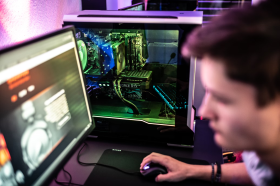ESports in Canadian Universities: A new path for scholarships and careers
Published: July 16, 2025
Late-night skating and house LAN parties are no longer the limit of the world of esports. In Canada, universities are turning the digital hobby into real opportunities, from scholarships and specialized programs to full-time jobs in the industry. How did this shift happen, and where does it go from here? Let’s find out.
Campus Arenas Are Coming to Life
Canadian universities are quickly turning into esports hubs: student lounges have replaced the silence with the hum of screens, team shouts, and the noise of spectators. In 2024, Ryerson opened a fully equipped gaming zone, and the University of British Columbia invested a quarter of a million dollars in a digital sports hub. League of Legends, Valorant, and Rocket League — these are no longer just games, but part of campus culture with tournaments, broadcasts, and fan bases. And when you want to take a breather and switch gears, Thimbles demo comes into play: a little luck, a little intuition, and not a drop of stress. The mechanics are simple: the ball is hidden under one of three cups, they are mixed up — and you need to guess where it is.
From Casual Play to Competitive Leagues
What started as friendly evening skating has evolved into serious student leagues with tryouts, coaches, and national finals. More than 40 Canadian universities now play in Tespa Canada and CEA — in total, this is over 5,000 active players. At Ontario Tech and St. Clair College, eSports players train on par with athletes: they analyze opponents, review gameplay, monitor nutrition — everything like adults.
Want to be closer to the competition without leaving your couch? With MelBet APK, you can follow your favorite teams and bet on games — more than 30,000 events every month. The application provides access to over 25 bonuses and supports more than 60 payment systems, operating smoothly and without lag on Android devices. eSports is growing — and with this application, you are always in the thick of things.
Universities Backing eSports with Scholarships
And yes — scholarships are real. More schools are offering financial aid to top players. This isn’t just a trend, it’s a funding model for talent. Here’s how some universities in Canada are investing:
| University | Scholarship Amount | Game Focus | Team Size | Year Established |
| St. Clair College | Up to $4,000 annually | Overwatch, Rocket League | 30+ | 2017 |
| University of Waterloo | $1,500–$3,000 | League of Legends | 20+ | 2019 |
| University of Manitoba | $2,500 | Valorant | 15 | 2022 |
| Durham College | $1,000–$5,000 | Multiple titles | 25+ | 2018 |
Colleges recognize that digital athletes train, perform, and compete under pressure, just like their counterparts on the basketball court or ice rink.
Building Careers Beyond the Game
Esports is no longer just about gaming. An entire industry is growing around it with jobs in broadcasting, marketing, analytics, game design, and production. Simon Fraser University graduates are already working at ESL Gaming and Ubisoft, and former Humber College students have moved to teams responsible for streaming content on Twitch and YouTube Gaming. Everyone is in demand: commentators, analysts, stream editors, and even team psychologists.
In 2023 alone, Canada's gaming industry added over 2,400 permanent jobs. At the same time, there are more than 700 gaming companies in the country, which means internships now go far beyond programming. For example, Sheridan University hosts career fairs entirely dedicated to digital sports and gaming, attracting recruiters from all over the continent.
Student Communities and Lasting Connections
At the center of the entire eSports ecosystem are not just competitions, but the people it unites. Teams bring together students from different faculties, cultures, and even countries. And the scene is growing thanks to a lively student drive:
- Weekly tournaments and intra-university games on campuses
- Discord servers that students themselves run for sparring and mutual assistance
- Charity events that raise thousands for local projects
- Streamer clubs that help develop their own style and audience
These are not just clubs “for fun” - these are platforms where they learn to take responsibility, work in a team, and find their place. And friendships that begin at the keyboard last a long time, much longer than the game lasts.

Academic Programs Catching Up with Demand
While esports is rapidly gaining momentum, universities are trying to keep up — their curricula are adapting to the new market. More and more universities are adding specialized courses. Lambton College, for example, has launched a two-year diploma in eSports management, where students learn everything from sponsorship contracts to organizing tournaments. George Brown College is already teaching a course on strategic management in esports, in partnership with major event companies.
The University of Calgary has recently launched a course on the psychology of games and team effectiveness. Here, students are introduced to the principles of maximum productivity, methods of working with stress, and techniques for strengthening team chemistry. And no, this is not “skipping a couple of lectures” — the courses are tailored to real tasks and prepare specialists for a multi-billion-dollar global industry.
Dreams Start with Passion and a Good Ping
Once upon a time, all this was just a hobby in bedrooms and basement gaming corners. Today, it’s selling out university classrooms and has real prospects. Canadian students are turning their hobby into a profession, building careers on what they love — and the movement is only gaining momentum. Want to play the same game? Grab your mouse, check your ping — and go forward, step by step, to your goal!
- 'Marked by Iwobi' - Ex-Fulham star stops short of blaming Nigerian midfielder for Everton's second goal
- 'Ademola is unusual' - Juric confirms rift with Lookman has been resolved ahead of Atalanta v Sassuolo
- Ajayi dropped from Hull starting XI after repeating similar mistake he made in WCQ v Lesotho
- Arsenal team news: Arteta names 17yo Nigerian forward in travelling squad to Sunderland
- PL2: Oyekunle continues his scoring run with Southampton's equaliser against Arsenal
- Nigeria squad announcement: Fulham, Wolves, Brentford stars called up; Okoye, Ejuke, Awaziem return
- 'The strongest always win does not exist today' - Gabon coach warns Super Eagles ahead of WCQ playoff
- 'Treats Icardi like a king' - Bol says Osimhen has no ego, offered Sane chance to take penalty v Ajax
- Bayer Leverkusen coach reveals when Super Eagles winger Nathan Tella will return from injury
- Martin O'Neill issues fresh injury update on Super Eagles striker Iheanacho pre-Kilmarnock
 Football News 24/7
Football News 24/7

- African Players
- Australia/ Asia
- Belgian Championship
- Bundesliga
- Danish Football
- English Premier League
- Non Gamstop Casinos
- Non Gamstop Casino sites
- UK Casinos not on Gamstop
- Nigeria National Teams
- Nigeria Premier League
- Norwegian Football
- bk8
- 789club
- iwin
- Football Betting
- Polish Football
- Russian Championship
- Serie A
- vt88
- Vt88
- Keo nha cai moi
- Spanish Liga
- Swedish Championship
- Transfer
- Turkish Championship
- 1Win
- Ukrainian Football
- Uncategorized
- Women's Football

